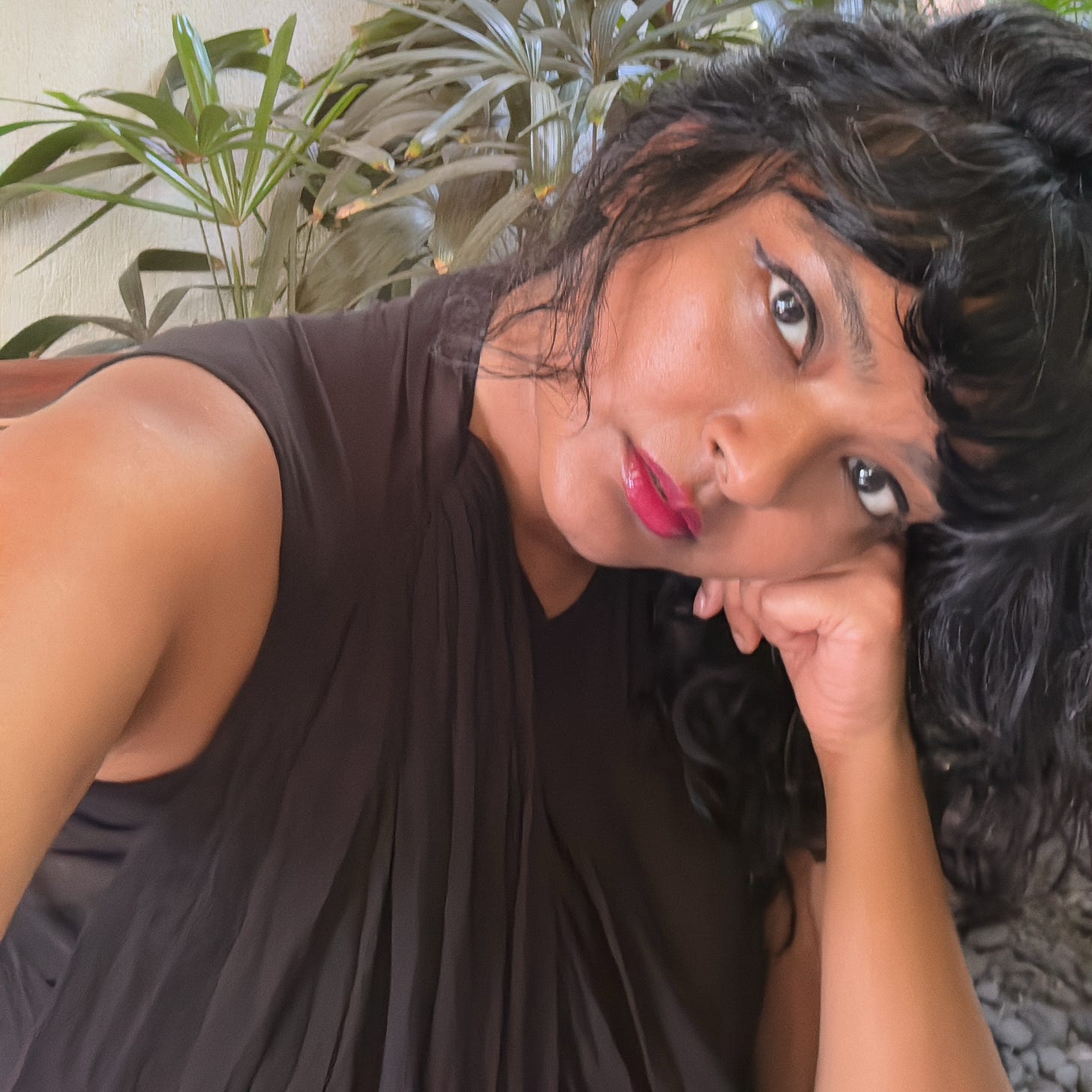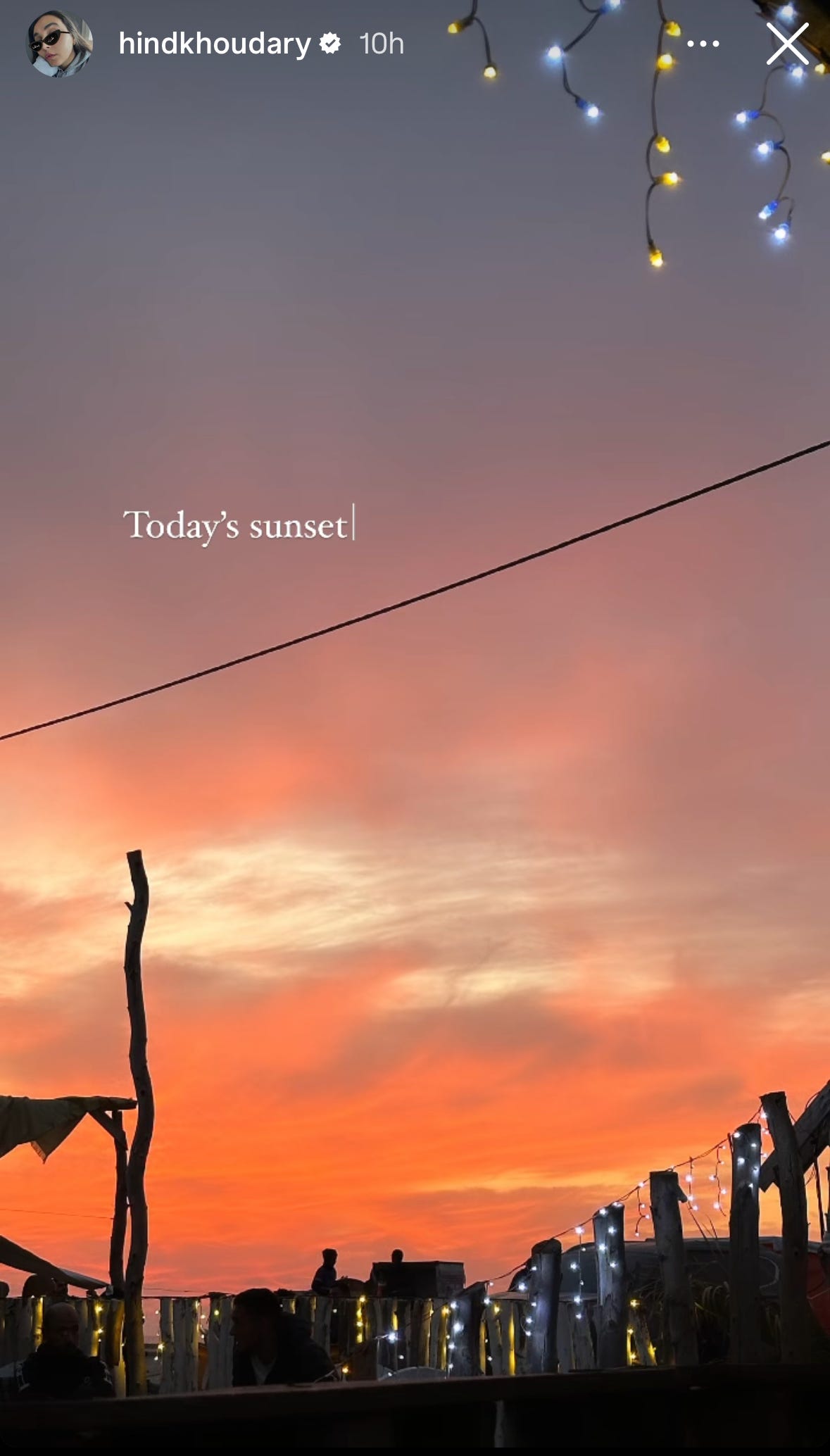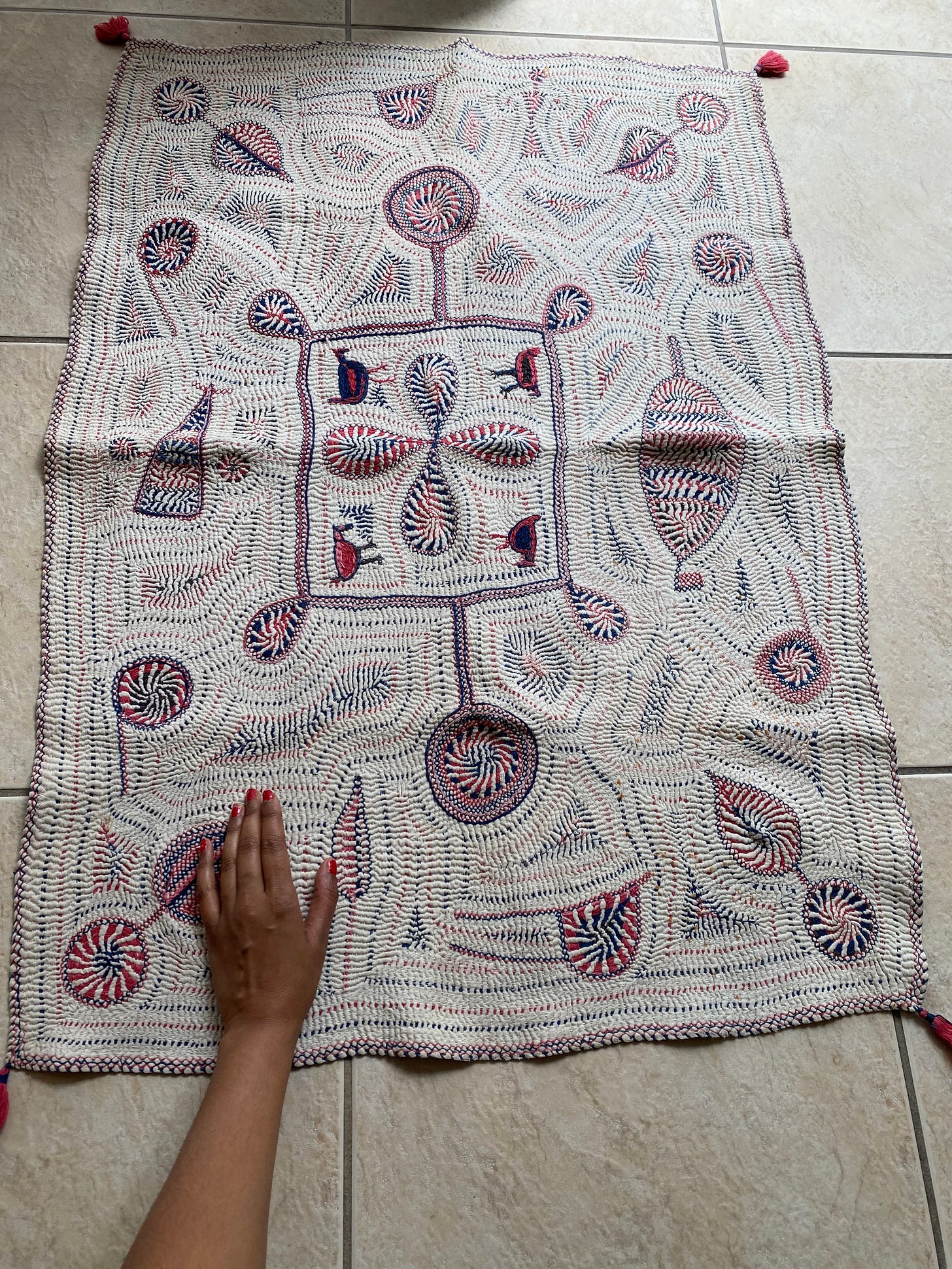The Beauty That Survives Domination
The Day That Changed Me. Free Palestine. Genocide. Self-Immolation. Cocooning.
February 27 is a significant day for me. It’s the day when I first understood what it meant to be dominated and violated by another human being. A few hours changed the course of my life. I remember fragments of that day, 27 years ago—I was a fourteen-year-old cutting school. I wore white silk pajamas. I remember the sour taste of a 22K gold cross, the smell of Issey Miyake cologne, the nauseating scent of curry permeating my first boyfriend’s house. I’ve written a lot about being a survivor. Each time a different way. The shape of this wound has evolved, as I have; it is no longer a pulsing, urgent feeling of rage in my body. Where I once tried to destroy myself, I’ve channeled this fire into my practices, my work. This is the year that I’ve taken up strength training for the first time in my life. I burst into tears after particularly challenging sessions because I’m carrying so much in my body that is wordless, weighted pain, from an older self, meaning a much younger self. It has taken me almost 30 years to see me, as a person strong enough to fight back, not with the armor of my words or the ways I adorn myself—but with this body. This body that I write with, fingers tapping, hunched over my soft belly, dry-mouthed because I’m not getting up to drink water. This body that sniffs materials in a perfuming practice that has allowed me to evoke moments in life when I’ve felt a sensual oneness between body and spirit, a summoning of a memory that returns me, and my wearer, to a place of serenity, seduction or joy—this is the beauty that has persisted, the beauty that has survived domination.
Where do I even start writing this piece about the beauty that has survived domination?
(Originally, I wanted to write this piece for Harper’s Bazaar, but sadly, I refuse to write for them now, after they’ve shown their disregard for Palestinians by siding with Zionists & silencing their editor-in chief, Samira Nasr.)
For the last nearly 150 days, we have witnessed Palestinian annihilation as close up as one can in the modern age. We have witnessed Aaron Bushnell, a brave young white man, burn himself alive, the second person in the U.S. to do so in response to the War on Gaza. We have no details or images of the woman who self-immolated in Atlanta. Bushnell’s screams, “Free Palestine! Free Palestine! Free Palestine!!!!!” until he could no longer utter the words haunt me. Just as the gun pointed at him, instead of a fire extinguisher. The absurdity of American policing and governance exposed by this protest—he refused to be complicit in genocide. The late, great Buddhist teacher Thich Nhat Hanh, in a letter to MLK Jr., about the monk Thich Giac Thanh, who self-immolated in protest of the Vietnam War, wrote how this act is an “unconditional willingness to suffer for the awakening of others” and how “in the Buddhist belief, life is not confined to a period of 60 or 80 or 100 years: life is eternal. Life is not confined to this body: life is universal.”
Burning oneself alive for what they believe is a deep commitment to awakening humanity to their ardent cause, and I bow down to this, I do not have this in myself. I gaze at the flame of a candle when I sit for meditation, but I learned to avoid fire after early burns. To see a man in our time choose fire, to burn his body as so many Palestinians have burned by missiles, shakes something in my core. I write this in a un-meditated state, as a nascent Buddhist practitioner, uncertain of how to take in those words. They sound beautiful, and they sound true. Yet—everything is so profoundly ugly. How can I comprehend the eternality of life, when we have witnessed through our phones, made by impoverished and abused human beings in the Congo, the evisceration of human beings in Palestine—none who did a thing to deserve their fate?
My way of moving through my private suffering? I reach for, I seek, I create—beauty.
I rage, I dance, I love, I fight, I take risk. I cry, damn near every fucking day.
What does any of it matter in a world that feels so devoid of beauty, so wretchedly entrenched in the falsehood of Western humanity? We know that assimilating into a dominant culture won’t give us power and protection, especially if we threaten the dominant culture. Look at the most successful people of color all around us are buying into the dominant culture’s institutions, media companies, universities. Even though we know the ruling class of men in suits are as savage as their ancestors. Even though we know we’ve never actually lived in a post-colonial world. We are still reckoning with the damage in this version, a renamed old world order, protected by institutions and universities perpetuating their lies.
The writers and artists I want to listen to now, the ones who I trust, are the ones ardently protesting this war on Gaza. What is the cost of being a writer-in-residence, a faculty member, when you have stability to keep creating work, but are silenced? We know that solidarity with Palestinians, in Gaza, the West Bank and in diaspora might cost us those positions. We know the power of words—the world burns for ancient words—we understand the grave necessity of dissent. Writers and artists and healers must cultivate an absolutely clear, illuminated heart and mind during these times. These are the words, art and teachings that will last. I don’t want to think about Beyoncé or Taylor Swift or Padma Lakshmi or any of these silent fascist feminine icons we worship, because their silence is louder than any song or television show.
Being a survivor taught me to wrest back my power through words, through art, ever since the moment I stumbled into the literary magazine in high school and wrote my first poems. (One day I will return to poetry…but for now, I remain, as one citizen reviewer of my book called me, a poet manqué.)
Yesterday, when I went on a long walk on the Williamsburg bridge, I wept a lot, as I spoke on the phone with a Bangladeshi femme artist friend. The sky turned gorgeous psychedelic purples, oranges and amber tones, and I thought of the Palestinian journalist Hind Khoudary’s sunsets in Gaza, I wondered if the sky felt as brilliant as the one I saw.
Sunsets on water, the eternal source of beauty for all humans, a freedom we all deserve. It made me so happy to see that yes, the sky in Gaza had been even more beautiful than the one setting over the East River.
I admit, the last five moths, I’ve lost hope that there’s any point in my aesthetic work—was the mountain of debt and interest worth it? For Beauty? I’m paying the same prices as big corporations for materials, marketing, software, peddling goods that I imagined to reconnect people to nature, to ritual, to color—ideas remixed and stolen by those corporations. I return to why I started all of this—to make a life of beauty, free of those dead institutions; to make a life of beauty, where I could adorn my people and cast them in campaigns and see us for once as an aesthetic in the dominant culture.
I’ve come to learn the hard way, the only way that I learn, these efforts would be met with resistance, critique and outright rejection. I know that being a public figure, an artist, on the Internet, and just being a brown skinned femme who loves sex, love, beauty, and femme magic shit, is an invitation, not only for connection and solidarity, but coveting, and jealousy.
February 27 lives in my body, even though I have been processing and working through it for decades now. I wanted to reflect on how to nurture my heart in this era of my writing life, on the anniversary of a day that brought me so much suffering, for so many years. But I reflected on much pettier, stupider things. I reverted to an old me, a rageful and hurt me. Twenty-seven years later, it amazes me how I still spiral or struggle with rejection, how much I let it hurt me, how it returns me to a place where I question my very worth.
Within the last month: I’ve been called a Brown Karen by a book club founder, based on my book In Sensorium; I’ve been asked by a model and muse of mine to remove images from a beauty campaign, perhaps in hindsight it all felt too risqué, too controversial, too embarrassing; I’ve been told by another business owner with 10 years less experience than me that I send too many emails and thus dilute the luxury aspect of my brand; I’ve been told by another artist in comment on a Tiktok post I made about how pointless art making feels during a genocide, Yes, how difficult you just sit in your fancy apartment provided by wealthy parents and a white passing husband—you go girl!—as if I’m not working myself to the bone to pay for this campaign, for this perfume launch, for this mortgage on this 1980s as fuck condo, my studio rent, my staff and write books in a market that could give a shit about Bangladesh. Of course, of course, these haters are all South Asian folks—I too, have trolled my people for partying at the White House. I ask myself why it hurts me. Why does it feel like each incident reiterates to me a feeling that every survivor feels: they hate me and I’m not good enough.
I release all of that here.
Let me try to return to my newfound Buddhist practice, a reminder that all beings know suffering, and we unskillfully deal with each other and perpetuate more suffering when we do so. Let me try to remember that all beings deserve love and compassion, instead of holding onto the feeling that derails me: Fuck them. They don’t deserve me for one more second. Blocked.
In therapy, I’m working through the rage that arises from rejection. I know this rage lives in my body, a deep well that I draw from, but too much is poison. Not only for others, but for myself. There is an ancestral quality to this rage, and I felt it so acutely when I saw a photograph of my paternal grandmother, Lutfunnessa, who married at 9, and had six children who lived (I’m not sure how many didn’t make it past infancy). My Dadu died in her 40s, and her face, I see so much pain, so much rage. Her rage reflected back onto me, a rage much older that cold afternoon on February 27. I learned this past year that she’d been a brilliant embroiderer of nakshi kantha, an intricate mapmaker of running stitches in a tapestry that my parents brought back to the States after a trip to our family home in Pabna, Bangladesh. My sister and I never met her, and my mother never met her when she married my dad as a young, but not as young bride. My Dadu’s face crackles with so much emotion in this photograph it brings up an immediate constriction of my throat, this longing for her to see her lineage in me. Would she be ashamed of me? Would she reject me? Would she feel cared for by me? Would she love me? I’ll never know. What I do know, is that so many of us know this rage—including the people who dislike me—it is the exhaustion of holding up the world, full of people who don’t hold you back.
After February 27, 1997, I stopped trying to contain myself just to be more at ease, or to make others feel more at ease. I had the consciousness—I am an artist—as young as age four, but perhaps my assault was the inciting incident, when I chose art-making and creative life, as an adult. When I chose to make my life my work of art. So many of us write from a place of reckoning, of wanting to heal the damage of our lineages. We write to make sense of the mundane, the disturbing. We write truth, knowing that truth is a shapeshifter, a trickster who adapts to the truth-teller’s form. I hold each image from Gaza that I will never unsee, or unhear, in my heart. I will never forget beloved Sidra, before her lifeless body dangled from the side of a wall; or the young boy who spoke English at the press conference (is he alive?); Hind’s cries for help when her family lay shot in a car beside her for hours, the screams of every child who had a limb amputated without anesthesia, the parents and grandparents crying to Allah for the souls of their soul to return to the Divine, far, far away from the manmade hell they never, ever deserved.
Words record how this world is crumbling, words make sense of the aftermath of violence. We will continue to witness, not only death, but uprising, on every place on Earth that knows the gruesomeness of genocide, enslavement and war. On February 27, I chose words as my shield, my protection, and my bite. Today, I surrender these words to you, and these will be my last words online, until I finish a draft of my forthcoming novel, Stellar Smoke (Dutton Books, 2025 y’all!) Being a survivor teaches you how to build your own cocoon, the boundaries that hold you together, a life raft finding its way across the tides. May our words build the future we wish to see out of the ashes. From those ashes, may we know there is a beauty that persists. The beauty that will survive domination. Our pain, this dukkho, is the air we breathe, but so too, is the beauty that will survive genocide. This is what hurts so much—the ones who perish will never live to see this become true.
Love, Tanaïs





